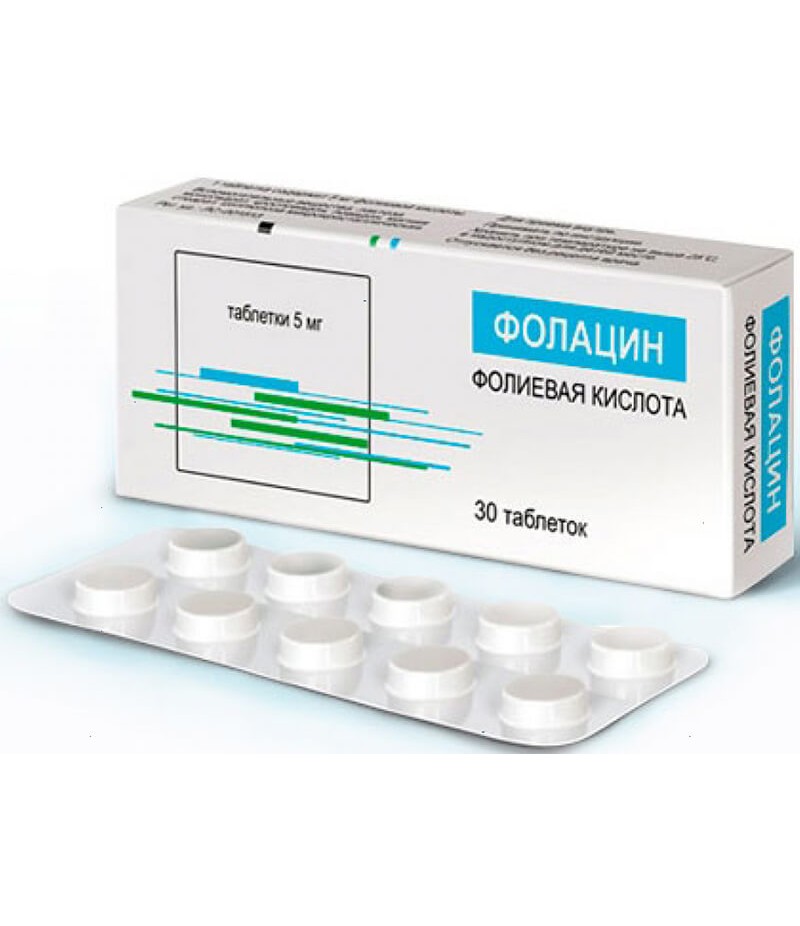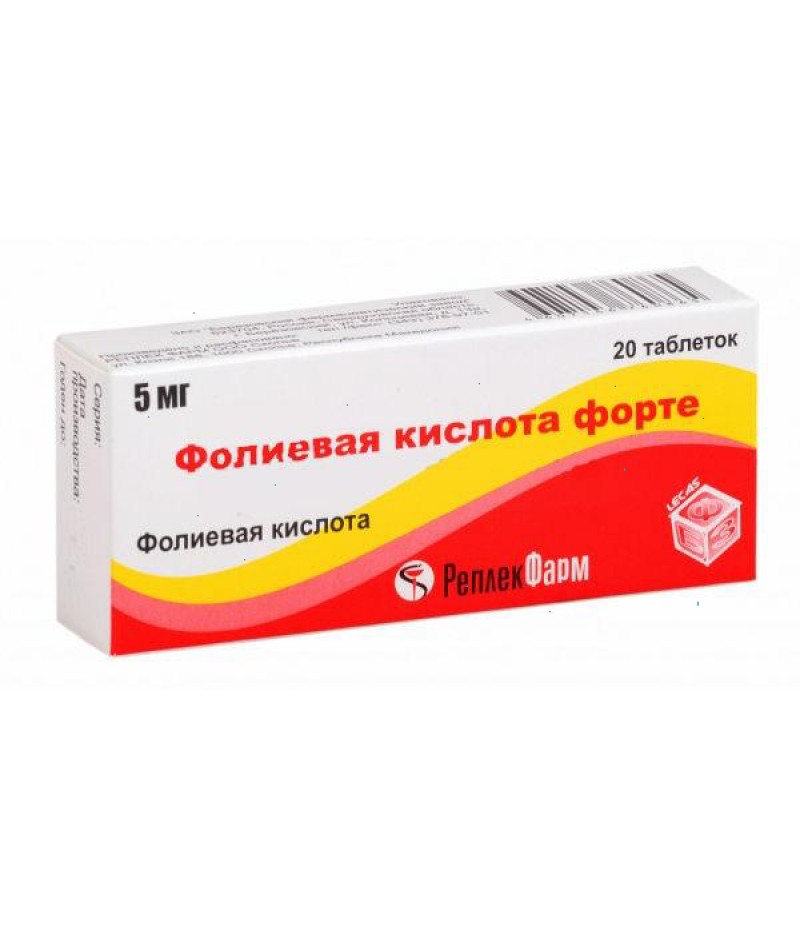Folacin tabs 5mg #30
- $7.78
- 3 or more $7.50
- Availability:In Stock
Instruction for FolacinYou can buy Folacin on this pageCompositionThe tablet contains: active substance - folic acid - 5 mg, auxiliary components: lactose monohydrate, cellulose microcrystalline povidone, crospovidone and magnesiu..
Tags: tabs
Instruction for Folacin
You can buy Folacin on this page
Composition
The tablet contains: active substance - folic acid - 5 mg, auxiliary components: lactose monohydrate, cellulose microcrystalline povidone, crospovidone and magnesium stearate.
Form of issue
Folacin is available in tablets with 5 mg of active substance, packed in 10, 20 or 30 pieces.
pharmachologic effect
The drug has hematopoietic action.
Pharmacodynamics and pharmacokinetics
Folacin belongs to the group B vitamins. When it enters the body, it becomes tetrahydrofolic acid, as a coenzyme involved in important metabolic processes and necessary for the full maturation of megaloblasts, as well as the formation of normoblasts. Deficiency of folic acid leads to the development of megaloblastic type of hematopoiesis. Normal intake of the substance in the human body contributes to the stimulation of erythropoiesis, improves the synthesis of amino acids, for example, methionine, serine, glycine, nucleic acids, purines and so on.
During pregnancy, folic acid provides protection for the fetus from teratogenic and damaging factors. And it also favors the normal maturation and activity of the placenta.
After entering the body, absorption of folic acid takes place in the gastrointestinal tract, almost immediately binding to plasma proteins. Then the substance is deposited in the liver and tetrahydrofolic acid is formed from it.
This component penetrates the placenta, GEB, and enters the breast milk. The maximum concentration in the blood is reached within 30-60 minutes. Removal of the drug occurs unchanged or as metabolites through the kidneys, after about 5 hours.
Indications for Folacin
The main indications for the use of folacin are:
treatment and prevention of folate deficiency caused by unbalanced or malnutrition;
treatment and prevention of various types of anemia on the background of a lack of folic acid in the body, for example, in the development of diseases and complications, lactation and pregnancy, and so on.
In addition, the drug is prescribed for pregnant women to prevent the development of neural tube pathologies in the fetus.
Contraindications for use
intolerance of the drug components;
malignant neoplasms;
pernicious anemia;
deficiency of cobalamin.
Side effects
In the treatment of folacin and other folic acid preparations, allergic reactions can develop in the form of itching, skin rashes, erythema and bronchospasm.
Also, one should not exclude deviations in the activity of the digestive tract, for example: anorexia, nausea, bitter taste in the mouth, bloating and other.
Instructions for Folacin (Method and Dosage)
The drug is intended for ingestion. According to the instructions for the use of Folacin, various dosages are used in the treatment or prevention of folic acid deficiency.
For example, in the treatment of megaloblastic anemia, a daily dose of 5 mg is prescribed, and 2.5 mg for the prevention of this condition.
To prevent the development of fetal neural tube defects, it is recommended to take 2.5 mg for 4 weeks before the expected pregnancy. Then, during the first trimester of pregnancy, the medication continues.
Perhaps the appointment of higher maintenance dosages, for example, patients with alcoholism, chronic infectious diseases and taking anticonvulsants.
Overdose
Cases of overdose are not established.
Interaction
Simultaneous reception with chloramphenicol, tetracyclines, neomycin or polymyxin leads to a decrease in absorption of folic acid.
The use of folic acid reduces the effectiveness of contraceptives, ethanol, sulfasalazine, glutetimide, cycloserine, methotrexate, primidin, phenytoin and so on.
Also, sometimes taking folic acid lowers the plasma level of phenobarbital, primidon and phenytoin, causes an epileptic fit.
In addition, with simultaneous reception of colestyramine with folic acid, a decrease or a change in absorption is noted. For this reason, folic acid is recommended for use an hour before or after 4-6 hours from the time of reception of colestyramine.
Terms of sale
In pharmacies, the drug can be purchased without a prescription.
Storage conditions
The storage area should be protected from children, have a temperature of no more than 25 ° C.
Shelf life - 5 years.
Alcohol and Folacin
It has been established that alcohol reduces the absorption of folic acid, so it is better to refuse it.
Folacin in pregnancy
During pregnancy, folic acid is one of the most necessary components for the female body. Moreover, Folacin is prescribed both in the planning of pregnancy and after its onset.
It is established that this component is involved in the most important processes of the body: hematopoiesis, the production of nucleic and amino acids, the metabolism, the activity of the nervous, cardiovascular and other body systems.
In pregnancy, folic acid is prescribed to ensure the normal formation and activity of the placenta, the development of the neural tube in the fetus and cell division. Also, this substance protects the embryo from negative and damaging effects, prevents the development of pathologies and promotes the successful course of pregnancy.
If the body lacks folic acid, it increases the risk of premature birth, placental abruption, postpartum bleeding, vitamin deficiency in newborns, and so on. Therefore, women are prescribed folic acid or folacin. Moreover, as the reviews show during pregnancy, the need for this substance is constantly increasing, and its deficiency can be fully replenished only by the use of special drugs.
Reviews of Folacin
As shown by numerous reviews about Folacin, it is his appointment to women in planning pregnancy and in the first months of this critical period. Most women know that folic acid is needed for both the female body and the future baby, so no one doubts that it is mandatory.
Also, folacin is very popular with nursing mothers. Quite often mothers of newborn babies feel strong weakness and fatigue. After taking the tests, folate deficiency is often found.
According to specialists, Folacin is a highly effective vitamin preparation, which is actively used in clinical practice. Its main component - folic acid is included in the vital medicines that are used in therapy and how to prevent congenital malformations of the fetus, anemic conditions during lactation and pregnancy.


